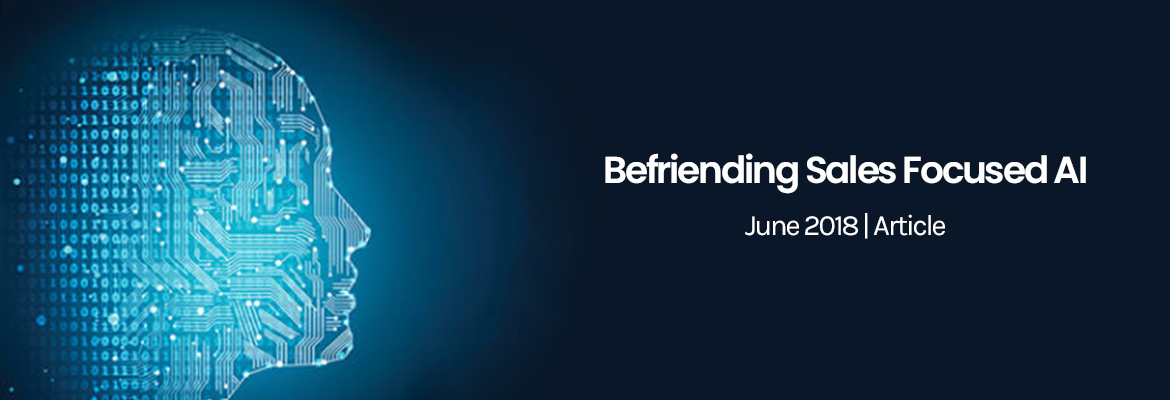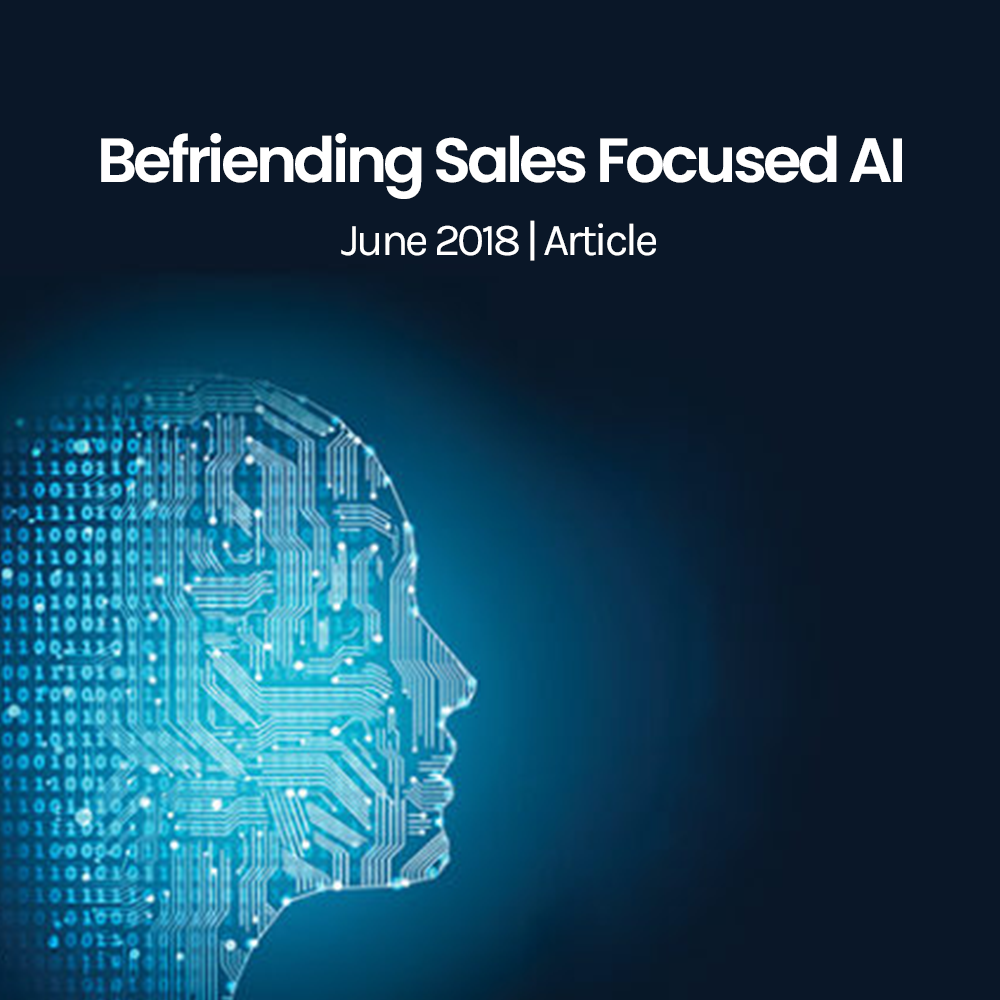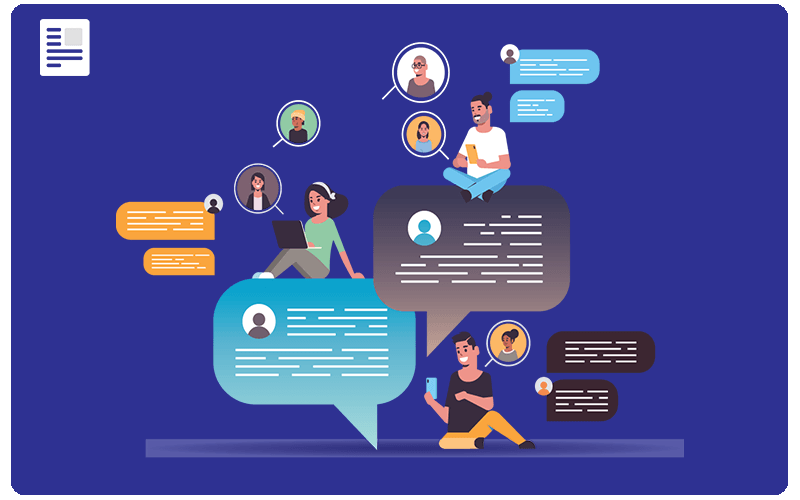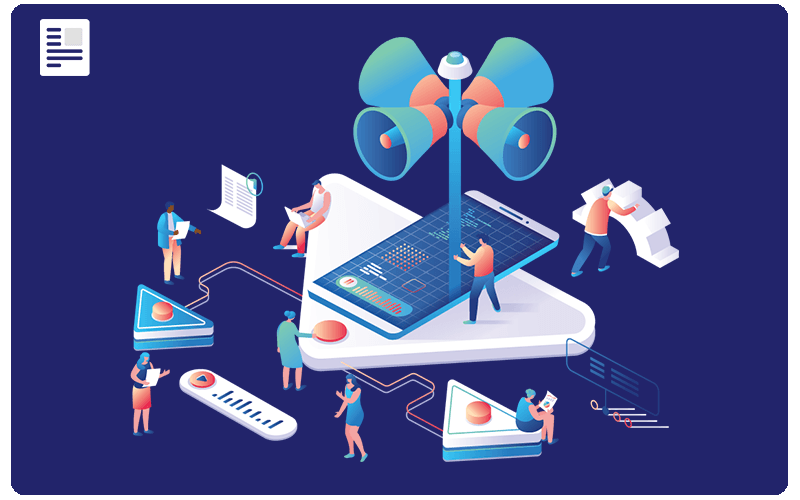

Imagine living in a time when your favorite sales productivity tool categorically prioritizes emails to your prospects, provides strategic recommendations on next steps, automatically takes cares of the approvals needed to move your deal forward, applies the right volume discounts to pending transactions, executes correct incentives for a future purchase, creates and mails customer invoices automatically, and does much more for a sales rep without them asking for it. Wouldn’t that be fantastic? Well, the good news is that you are already living in the time and it’s all happening thanks to Artificial Intelligence (or AI).

AI has had a lot of positive and negative press as of late and is being considered by many corners and circles as the ‘biggest’ and the ‘baddest’ enemy of the human species. Article after article attempts to side on ways its direct and indirect effects will either eliminate every job created on earth or that every virtual personal assistant, robot, sci-fi character, or deep learning algorithm is just there to make the end of humans inevitable. And while this sends waves of scare across the folks that have some comprehension of the capabilities of AI, majority of us, chose to ignore its realities. Many don’t even talk about it (like a bad disease), yet it has so much to offer. It is one of history’s biggest enhancers of industries and professions and is aiding scientific, industrial, biological and other breakthroughs that were once unimaginable by humans.
While it’s tough to tackle what AI represents as a whole, this article attempts to explore the side of AI that enables and amplifies the human ability to partner with machines to take on bigger tasks and be successful in doing so (especially in the context of business). And that, by definition is what AI represents. It is formally defined by some as the broader concept of machines making decisions or performing processes much like a human would. Machine learning is an application of AI that enables computer models to recognize shapes, designs, and patterns in existing data, allowing the machines to then learn for themselves the ways to take next actions or make business predictions. Each new piece of data received allows the machine to learn even more, update information, look for new patterns and continuously optimize recommendations.
AI – The sales amplifier
While enhanced automation and intelligence in almost every area of our lives is up for grabs when it comes to AI, sales is one of the bigger (known) beneficiaries of its advances thus far. The computational side of businesses that deal with influencing the ways humans acquire products and services is the frontier AI is starting to tackle well as the current toolset available within the AI and automation space now has the ability to take sales from reactive to proactive, and from instinct-driven to insight and data-driven. AI-driven sales can now self-guide the customer journey from identification to customer retention with the help of self-improving mathematical algorithms that not only capture but analyze any and all actions, by any and all customers, prospects, vendors, and communities at large but also continuously improve actions, offers, and processes for the organizations they chose to target. And while each automated area takes getting used to by the users, there are many ways in which this impacts sales in a positive way. Some of these areas are:
AI helps with prospecting: Most organizations have large sets of customer data (often in disparate systems) that can be leveraged and used by machine learning algorithms to provide insights into existing customer behaviors and predict future buying behavior. The algorithms can also analyze data about leads, predict lead conversions and score leads based on the patterns it identifies.
AI helps with cultivating and positioning: AI-enabled bots can now provide proactive answers to initial customer queries about pricing, product features, or contract terms. Machine learning algorithms compare historical sales efforts with prospects data (company size, stakeholders, solutions they wish to acquire) and predicts the most effective solutions that fit the needs of the customer. It can also identify the influencers of the deal, recommend activities that would increase the chances of a sale, find potential cross sell and upsell opportunities and predict the time it will take for the deal to potentially close.
AI helps with forecasting: AI has the ability to generate revenue forecast predictions on both macro and micro levels that helps with resource allocations, pipeline building, analyzing team performance, and be cost-effective. With prescriptive insights, sales resources and their managers can now get perspective into sales trends in their markets and actions that may needed to be taken in order to make improvements to the sales processes.
AI helps building effective and focused sales teams: Customized trainings on productivity and effectiveness can now be created based on patterns of star performers where the focus on high value tasks is high and the administrative tasks are left for tools to manage.
AI helps close deals faster: Thousands of manhours can now be saved in coming up with the right pricing and discounts that can be easily calculated using historical sales data as well as the type of discounting strategy used by top reps on top deals across the regions. Quotes are also now auto generated based on these trends and sent to the customer without human intervention.
AI uses data over intuitions in account planning: Many account plans are full of intuitions and swags when it comes to understanding the client’s needs, positioning the right types and amounts of products (or services) and other areas of the planning process. AI eliminates the guesswork, uses precision data to predict buying behaviors based on the right patterns and allows the right strategy to be created for the accounts.
AI makes customer service faster: Service is now considered the new sales. With customer service chatbots at the helm, customers and prospects get bulk of their questions answered through these automated bots and as a result, are much more in the know about the products, the potential issues it can face and are much more ready to buy than they were before.

AI – The provider of cool sales productivity tools
Every sales-focused tool (including all major CRM’s) has its own version of AI baked in with a basic purpose of providing automation and intelligence for its customers to leverage. Niche players are starting to fill in gaps and identifying AI-enabled offerings that can be used in conjunction with these CRM systems and can be very impactful. Some of these offerings combs through large sets of data to arm professionals with information and insights they don’t have the time or ability to find themselves. In doing so, AI-driven sales help many of these organizations significantly boost and scale sales productivity and achieve success in ways previously not possible through platforms that were not enabled with AI.
Some of the AI driven sales tools for advanced productivity are:
- ANGIE: An AI powered sales assistant by Conversica, helps companies better identify leads without sales reps having to manually go through their large database. Angie sends 30,000 emails per month, analyzes responses to identify promising leads, and assigns them to the appropriate salesperson, saving reps time and increasing efficiency.
- AMY AND ANDREW: Virtual assistants by X.ai, respond to messages about meetings and calls without alerting the sender that they are robots.
- NUDGE.AI: Provides sales teams with actionable insights on their target customers by leveraging AI and machine learning to source news and social updates on both the individual and account level. This is done by filtering through massive amounts of data from across the web.
- PEOPLE.AI: Collects sales activity information to see where sales teams spend their time and then uses that information to identify stagnant deals, gives early warning alerts about deals that are slowing down, and creates an activity-based success roadmap for every opportunity.
- CRYSTAL KNOWS: Offers personality insights at the point of need, helping sales pros improve their communication with customers, prospects, and co-workers.
- TALKIQ: Integrates with phone systems to analyze phone conversations between sales pros, customers, and prospects. It identifies key differences in approaches that directly affect success and assesses the effectiveness of sales tactics on sales KPIs.
- PERSISTIQ: Helps pool sales pros together to move faster and sell faster than they were before. It automatically clones successful workflows and refines the sales process to lead them to success.
- CHORUS.AI: Uses artificial intelligence to record, transcribe and analyze sales calls in real-time, revealing why deals are won and lost.
- ALEXA: The popular household gadget by Amazon, is learning to recognizing speech patterns for better understanding of potential customers and prospects. Amazon is believed to be working on the next generation version that will make advanced speech recognition an offering for sales.
- GOOGLE ASSISTANT: Recently demonstrated its abilities to make machine generated calls to humans to successfully book appointments. It uses data and machine learning algorithms to accomplish this and is on plan to be leveraged by sales professionals to aid them in automating sales and lead generation calls.
AI – The helper and guide

Leveraging the right AI can be a strategic advantage in sales as the predictive nature of its analysis can amplify the ability of even an average rep to that of a super star. The business impact of that on the selling capability of an organization is big and while most professionals and organizations (at least in the continental United States) are starting to see the right value in AI and automation, some still have a hard time trusting the technology. They use data security, the fear of AI making errors, losing control over their data and most importantly, being replaced by an AI engine as excuses to not engage with it. The truth of what AI enables (as established by this article as well as the current business environment in general) could not be further from this as the professionals that have adopted AI as a philosophy and its tools (even at a basic level) have seen nothing but growth and success in achieving their goals and beyond. Some of the reasons of success they share are:
- They are not afraid of AI and Automation and allow them provide guidance on strategic matters of business.
- They have made Efforts to develop a basic understanding of what AI and Automation represents, have invested in the creation of Automation Success Roadmaps, instituted AI Governance structures, and have employed effective Change Management campaigns and strategies for their organizations to learn and execute this area well.
- They make AI their Admin – let it handle their administrative and mundane tasks.
- They use the analysis provided by AI as a basic starting point and blend in their own business insights for excellence in transactional, operational and strategic areas of they use this for.
- They are beginning to form a Human-Machine Partnership by allowing the tools to have access to the right types of data so the machines can learn more and guide more.
AI as a productivity and automation mechanism is here to stay and is already making strides as a strategic lever of business success and growth. Soon, it will be hard to find a technology tool that is not enabled with some type of AI in it and while the unknowns and negatives of the effects of AI still exist (and many are true), this is a reality that one cannot afford to ignore. It’s time to take AI and Automation head-on and ‘befriend’ it for ultimate success in business and in life.
Imagine living in a time when your favorite sales productivity tool categorically prioritizes emails to your prospects, provides strategic recommendations on next steps, automatically takes cares of the approvals needed to move your deal forward, applies the right volume discounts to pending transactions, executes correct incentives for a future purchase, creates and mails customer invoices automatically, and does much more for a sales rep without them asking for it. Wouldn’t that be fantastic? Well, the good news is that you are already living in the time and it’s all happening thanks to Artificial Intelligence (or AI).

AI has had a lot of positive and negative press as of late and is being considered by many corners and circles as the ‘biggest’ and the ‘baddest’ enemy of the human species. Article after article attempts to side on ways its direct and indirect effects will either eliminate every job created on earth or that every virtual personal assistant, robot, sci-fi character, or deep learning algorithm is just there to make the end of humans inevitable. And while this sends waves of scare across the folks that have some comprehension of the capabilities of AI, majority of us, chose to ignore its realities. Many don’t even talk about it (like a bad disease), yet it has so much to offer. It is one of history’s biggest enhancers of industries and professions and is aiding scientific, industrial, biological and other breakthroughs that were once unimaginable by humans.
While it’s tough to tackle what AI represents as a whole, this article attempts to explore the side of AI that enables and amplifies the human ability to partner with machines to take on bigger tasks and be successful in doing so (especially in the context of business). And that, by definition is what AI represents. It is formally defined by some as the broader concept of machines making decisions or performing processes much like a human would. Machine learning is an application of AI that enables computer models to recognize shapes, designs, and patterns in existing data, allowing the machines to then learn for themselves the ways to take next actions or make business predictions. Each new piece of data received allows the machine to learn even more, update information, look for new patterns and continuously optimize recommendations.
AI – The sales amplifier
While enhanced automation and intelligence in almost every area of our lives is up for grabs when it comes to AI, sales is one of the bigger (known) beneficiaries of its advances thus far. The computational side of businesses that deal with influencing the ways humans acquire products and services is the frontier AI is starting to tackle well as the current toolset available within the AI and automation space now has the ability to take sales from reactive to proactive, and from instinct-driven to insight and data-driven. AI-driven sales can now self-guide the customer journey from identification to customer retention with the help of self-improving mathematical algorithms that not only capture but analyze any and all actions, by any and all customers, prospects, vendors, and communities at large but also continuously improve actions, offers, and processes for the organizations they chose to target. And while each automated area takes getting used to by the users, there are many ways in which this impacts sales in a positive way. Some of these areas are:
AI helps with prospecting: Most organizations have large sets of customer data (often in disparate systems) that can be leveraged and used by machine learning algorithms to provide insights into existing customer behaviors and predict future buying behavior. The algorithms can also analyze data about leads, predict lead conversions and score leads based on the patterns it identifies.
AI helps with cultivating and positioning: AI-enabled bots can now provide proactive answers to initial customer queries about pricing, product features, or contract terms. Machine learning algorithms compare historical sales efforts with prospects data (company size, stakeholders, solutions they wish to acquire) and predicts the most effective solutions that fit the needs of the customer. It can also identify the influencers of the deal, recommend activities that would increase the chances of a sale, find potential cross sell and upsell opportunities and predict the time it will take for the deal to potentially close.
AI helps with forecasting: AI has the ability to generate revenue forecast predictions on both macro and micro levels that helps with resource allocations, pipeline building, analyzing team performance, and be cost-effective. With prescriptive insights, sales resources and their managers can now get perspective into sales trends in their markets and actions that may needed to be taken in order to make improvements to the sales processes.
AI helps building effective and focused sales teams: Customized trainings on productivity and effectiveness can now be created based on patterns of star performers where the focus on high value tasks is high and the administrative tasks are left for tools to manage.
AI helps close deals faster: Thousands of manhours can now be saved in coming up with the right pricing and discounts that can be easily calculated using historical sales data as well as the type of discounting strategy used by top reps on top deals across the regions. Quotes are also now auto generated based on these trends and sent to the customer without human intervention.
AI uses data over intuitions in account planning: Many account plans are full of intuitions and swags when it comes to understanding the client’s needs, positioning the right types and amounts of products (or services) and other areas of the planning process. AI eliminates the guesswork, uses precision data to predict buying behaviors based on the right patterns and allows the right strategy to be created for the accounts.
AI makes customer service faster: Service is now considered the new sales. With customer service chatbots at the helm, customers and prospects get bulk of their questions answered through these automated bots and as a result, are much more in the know about the products, the potential issues it can face and are much more ready to buy than they were before.
AI – The provider of cool sales productivity tools

Every sales-focused tool (including all major CRM’s) has its own version of AI baked in with a basic purpose of providing automation and intelligence for its customers to leverage. Niche players are starting to fill in gaps and identifying AI-enabled offerings that can be used in conjunction with these CRM systems and can be very impactful. Some of these offerings combs through large sets of data to arm professionals with information and insights they don’t have the time or ability to find themselves. In doing so, AI-driven sales help many of these organizations significantly boost and scale sales productivity and achieve success in ways previously not possible through platforms that were not enabled with AI.
Some of the AI driven sales tools for advanced productivity are:
- ANGIE: An AI powered sales assistant by Conversica, helps companies better identify leads without sales reps having to manually go through their large database. Angie sends 30,000 emails per month, analyzes responses to identify promising leads, and assigns them to the appropriate salesperson, saving reps time and increasing efficiency.
- AMY AND ANDREW: Virtual assistants by X.ai, respond to messages about meetings and calls without alerting the sender that they are robots.
- NUDGE.AI: Provides sales teams with actionable insights on their target customers by leveraging AI and machine learning to source news and social updates on both the individual and account level. This is done by filtering through massive amounts of data from across the web.
- PEOPLE.AI: Collects sales activity information to see where sales teams spend their time and then uses that information to identify stagnant deals, gives early warning alerts about deals that are slowing down, and creates an activity-based success roadmap for every opportunity.
- CRYSTAL KNOWS: Offers personality insights at the point of need, helping sales pros improve their communication with customers, prospects, and co-workers.
- TALKIQ: Integrates with phone systems to analyze phone conversations between sales pros, customers, and prospects. It identifies key differences in approaches that directly affect success and assesses the effectiveness of sales tactics on sales KPIs.
- PERSISTIQ: Helps pool sales pros together to move faster and sell faster than they were before. It automatically clones successful workflows and refines the sales process to lead them to success.
- CHORUS.AI: Uses artificial intelligence to record, transcribe and analyze sales calls in real-time, revealing why deals are won and lost.
- ALEXA: The popular household gadget by Amazon, is learning to recognizing speech patterns for better understanding of potential customers and prospects. Amazon is believed to be working on the next generation version that will make advanced speech recognition an offering for sales.
- GOOGLE ASSISTANT: Recently demonstrated its abilities to make machine generated calls to humans to successfully book appointments. It uses data and machine learning algorithms to accomplish this and is on plan to be leveraged by sales professionals to aid them in automating sales and lead generation calls.
AI – The helper and guide

Leveraging the right AI can be a strategic advantage in sales as the predictive nature of its analysis can amplify the ability of even an average rep to that of a super star. The business impact of that on the selling capability of an organization is big and while most professionals and organizations (at least in the continental United States) are starting to see the right value in AI and automation, some still have a hard time trusting the technology. They use data security, the fear of AI making errors, losing control over their data and most importantly, being replaced by an AI engine as excuses to not engage with it. The truth of what AI enables (as established by this article as well as the current business environment in general) could not be further from this as the professionals that have adopted AI as a philosophy and its tools (even at a basic level) have seen nothing but growth and success in achieving their goals and beyond. Some of the reasons of success they share are:
- They are not afraid of AI and Automation and allow them provide guidance on strategic matters of business.
- They have made Efforts to develop a basic understanding of what AI and Automation represents, have invested in the creation of Automation Success Roadmaps, instituted AI Governance structures, and have employed effective Change Management campaigns and strategies for their organizations to learn and execute this area well.
- They make AI their Admin – let it handle their administrative and mundane tasks.
- They use the analysis provided by AI as a basic starting point and blend in their own business insights for excellence in transactional, operational and strategic areas of they use this for.
- They are beginning to form a Human-Machine Partnership by allowing the tools to have access to the right types of data so the machines can learn more and guide more.
AI as a productivity and automation mechanism is here to stay and is already making strides as a strategic lever of business success and growth. Soon, it will be hard to find a technology tool that is not enabled with some type of AI in it and while the unknowns and negatives of the effects of AI still exist (and many are true), this is a reality that one cannot afford to ignore. It’s time to take AI and Automation head-on and ‘befriend’ it for ultimate success in business and in life.




